Over the last three decades, India has undergone profound transformations across multiple dimensions. As the world’s largest democracy and one of the fastest-growing economies, India’s rise has captured global attention. The accompanying change in India and its approach – both internal and external – has far-reaching implications for the international system. To understand these transformations fully, this conference and subsequent edited volume will focus on three critical areas: India’s technological transitions, its economic transformations, and shifts in its international relations. These interrelated themes capture the essence of India’s ongoing journey and offer a comprehensive lens through which to examine the country’s dynamic evolution. The conference is co-sponsored by the College of Graduate Studies; the College of Sciences; the School of Politics, Security, and International Affairs; the Center for Global Economic and Environmental Opportunity; the Office of Research.
Keynote address by Ajay Kumar, Ph.D., former Defense Secretary of India
Panels on:
- India’s Technological Transitions
- India’s Economic Transformations
- India’s Evolving Global Footprint
Keynote Address
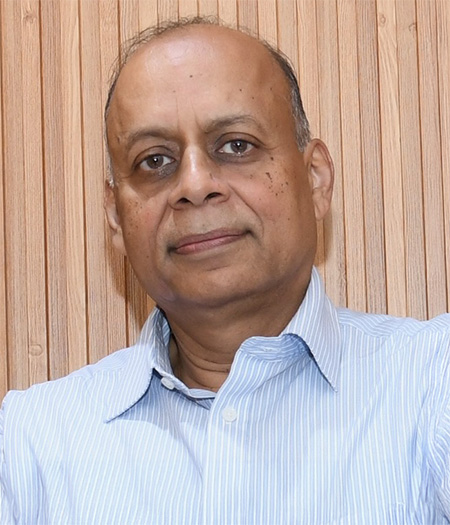
Ajay Kumar (Speaker) (Zoom)
From Assembly to Innovation: India’s Defense Industry Transformation Through iDEX
Abstract: India’s defense industry is shifting from licensed-production to an innovation-driven ecosystem, driven not by large corporations or research labs, but by agile startups. This transformation started with the launch of Innovation for Defense Excellence (iDEX) in 2018.
Biography: Dr. Ajay Kumar, former Defense Secretary of India (2019–2022), played a pivotal role in defense modernization, aerospace procurement, and industry reforms, including the corporatization of the Ordnance Factories Board. He was architect of iDEX and contributed to reforms in India’s geospatial and drone policies. Earlier, he was instrumental in Digital India, shaping Aadhaar, UPI, and Government e-Marketplace. A Distinguished Visiting Professor at IIT Kanpur and Senior Fellow at Carnegie India, he mentors startups and writes “Off the Grid” for Business Standard. He is also Founder-Chairman of Mounttech Growth Fund-Kavachh a VC fund supporting startups in defense, space and deep-tech. He holds a PhD from the University of Minnesota and a B.Tech from IIT Kanpur.
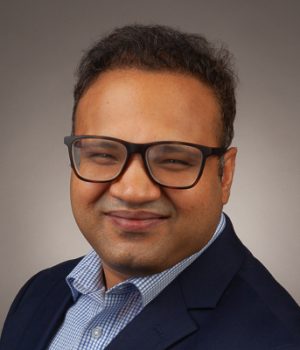
Yogesh Joshi (Moderator)
Biography: Dr. Yogesh Joshi is Indian Community Endowed Assistant Professor and Director, India Center. His research focuses on military technological diffusion among rising powers, conventional military and nuclear strategy, and alliance politics, with an empirical focus on India, South Asia and the Indo-Pacific.
Technology Panel
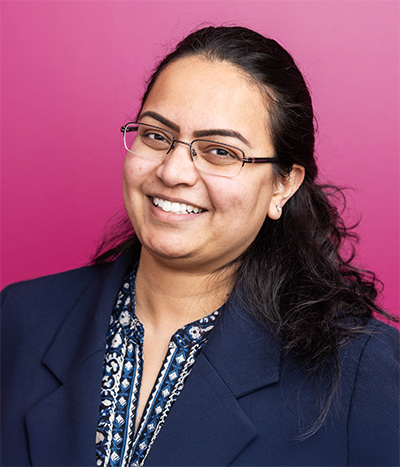
Shahana Sheikh (Speaker) (Zoom)
Crowds as Content: Party Campaign Strategy in the Digital Age
Abstract: Internet-based communication technologies have reduced the costs of voter outreach for political parties. Yet, parties continue to organize expensive in-person mass campaign rallies. What explains the puzzling persistence of such rallies, even as lower cost online alternatives for party-voter communication become increasingly available? Drawing on intensive qualitative fieldwork in India, I develop a theory that emphasizes content-complementarity: a mutually reinforcing relationship between physical and digital modes of campaigning. Social media creates a demand for online content and in-person mass campaign rallies supply valuable content to parties. The anticipated effects of rally content also alter how parties conduct rallies. Empirically, I test key implications of my theory with observational data from party social media accounts, original survey experiments with approximately 4,000 voters, and a novel survey of approximately 400 party functionaries. I show the centrality of rallies to the digital campaigns of major parties in north India. I demonstrate that content about the size and composition of rally crowds shapes voter perceptions and voter mobilization. In the digital age, parties transcend the limits of place and time through online rally content, and exposure to this content influences voters.
Biography: Dr. Shahana Sheikh is a Postdoctoral Research Fellow at the Center for the Advanced Study of India at the University of Pennsylvania. She studies political parties, political behavior, and party-voter linkages, with a regional focus on South Asia. Her research agenda is centered on how party strategy, campaigns, and political participation in developing democracies are shaped by significant transformations associated with development—especially, shifts in media and communication technology, urbanization, and environmental degradation. Shahana completed her Ph.D. in Political Science from Yale University. Prior to her Ph.D., Shahana was a policy researcher in the areas of urban governance and public finance in India.
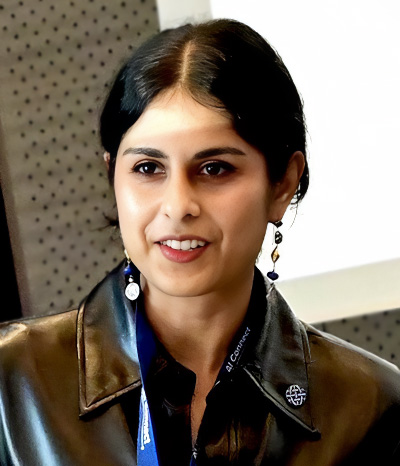
Trisha Ray (Speaker)
India’s Digital Trilemma: Growth, Autonomy and Partnerships
Abstract: India is making strides on digital governance. The country’s data protection law, long in the making, is finally here. The government is flexing its regulatory muscle, but its emphasis remains on economic competitiveness and innovation. What kind of digital future does India want? This talk will explore the fault lines shaping India’s approach to data and platform governance. It will examine how its policies attempt to strike the balance between user rights, a thriving digital economy, and a competitive market. Finally, it will outline how its policies build into India’s approach to digital sovereignty.
Biography: Trisha Ray is an associate director and resident fellow at the Atlantic Council’s GeoTech Center (GTC). She writes on the intersection of geopolitics and emerging technologies and leads GTC’s AI portfolio. Prior to this, Ray was a deputy director and fellow at Observer Research Foundation in India, where worked on India’s technology policies and partnerships in AI, data protection, platform governance, cybersecurity, among others. She also chaired ORFs flagship technology conference, CyFy. Ray has published with The Diplomat, Hindustan Times, The Wire and the Indian Express. Ray has also provided commentary for media outlets such as BBC, CNN-IBN, Nikkei Asia, Financial Times, Voice of America, The Economist, among others. Ray completed her MA in security studies from the Walsh School of Foreign Service at Georgetown University and a BA (honors) in journalism from Lady Shri Ram College, Delhi University.
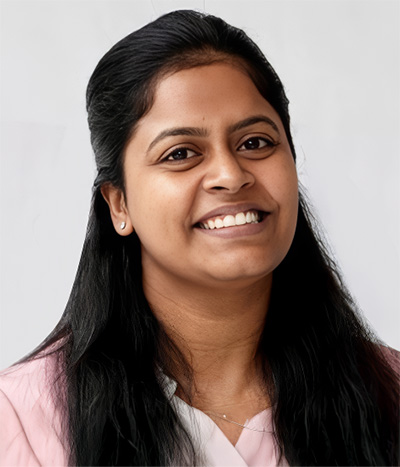
Akanksha Golchha (Speaker)
Role of Global South Partnerships in Accelerating EV Transition
Abstract: The rapid growth of transport sector in developing economies like India is closely linked to economic development, job creation, and trade facilitation. However, transportation is also a major contributor to fastest growing sources of pollution, air toxins, and smog, accounting for about 25 percent of energy related CO2 emissions, globally. While many countries in the Indo-Pacific and Africa have set policy mandates for electric vehicle (EV) adoption, significant bottlenecks persist in three key areas: economic feasibility, manufacturing ecosystem, and market development. This paper examines the role of Global South partnerships in overcoming these barriers by fostering collaboration in policy and technology exchange. It explores how joint efforts can drive advancements in areas such as retrofitting, battery circularity, and innovative charging models to address supply-side and infrastructure constraints. On the policy front, the paper draws lessons from successful approaches in India and the U.S., including fiscal incentives, supply-side regulations, and consumer-driven initiatives, which could be adapted to Global South context. By leveraging cooperative frameworks, these partnerships can enhance EV adoption, stimulate sustainable economic growth, create employment opportunities, and contribute to global climate goals.
Biography: Akanksha Golchha is a fellow with the Chair on India and Emerging Asia Economics at CSIS, where she leads projects on Global South collaboration in electric vehicles and clean energy. With nearly a decade of experience, she has deep expertise in the areas of renewable energy, climate change and gender equity. Previously, she led NRDC India’s RE program, focusing on energy security and gender. At Shakti Sustainable Energy Foundation, she designed programs to advance distribution sector reforms and improve energy access in India. An avid researcher, Akanksha has published in leading journals and digital platforms. She holds a master’s degree in regulatory governance from the Tata Institute of Social Sciences in Mumbai and is a qualified chartered accountant.

Kelsey Larsen (Moderator)
Biography: Dr. Kelsey L. Larsen is an Assistant Professor in the School of Politics, Security, and International Affairs (SPSIA), and the Associate Director of UCF’s Intelligence Community Center for Academic Excellence (IC-CAE). Her inter-disciplinary research explores the intersection of stress, trauma, and national security decision-making, with a focus on the feelings and behaviors of American service-members, veterans, analysts, peacekeepers, and leaders. Her work is funded by the National Science Foundation, and published in peer-reviewed journals including Political Psychology, Frontiers in Psychology, Military Medicine, International Peacekeeping, Medical Education, and Armed Forces & Society. She has also published book chapters in the fields of veterans’ mental health and mindfulness programs.
Economy Panel

Chaithanya Renduchintala (Speaker)
RISE for Transformation: Leveraging Traditional Systems for Global Tourism Futures Unlocking Medical and Spiritual Tourism Revenues through a Tamil Nadu–Orlando Partnership
Abstract: This research explores the economic and cultural potential of developing a bilateral medical and spiritual tourism corridor between Tamil Nadu, India, and Orlando, USA, through the lens of the RISE framework (Rich Intercultural Spiritual Exchange). Tamil Nadu is a leading destination in India for both spiritual tourism, with over 33,000 ancient temples, and medical tourism, attracting more than 1.5 million patients annually. It offers a unique fusion of traditional healing systems (Siddha, Ayurveda, yoga) and world-class medical infrastructure, supported by over 12,500 hospital beds, 1 million registered doctors, and 400+ pharmaceutical manufacturers.
Orlando, while known globally for entertainment and hospitality, is rapidly emerging as a wellness and medical innovation hub, with a strong ecosystem of biomedical research, digital health startups, and immersive experience design. This paper outlines how a collaborative model—linking Tamil Nadu’s spiritual and healthcare traditions with Orlando’s infrastructure, technology, and diaspora engagement—could unlock new revenue streams in wellness retreats, integrative medical packages, cultural immersion tourism, and telehealth-supported recovery journeys.
The framework in this conceptual paper, identifies key enablers (e.g., diaspora channels, joint ventures, policy frameworks), and proposes a phased implementation model. Findings suggest the potential for multi-billion-dollar growth in both regions by positioning tourism not merely as travel but as a healing, cultural, and economic bridge. The RISE model thus offers a blueprint for global destinations seeking to combine health, heritage, and human connection in tourism futures.
Biography: Dr. Chaithanya Renduchintala is an Assistant Professor at the Rosen College of Hospitality Management with the department of Tourism, Events and Attractions. Dr. Renduchintala works with the infectious disease and travel health initiative at the Rosen College of Hospitality Management. https://www.ucf.edu/news/3-ucf-colleges-receive-4-5m-for-infectious-disease-travel-health-research/. He holds a master’s degree in Bio Medical Science and a Ph.D. in Modelling and Simulation from the University of Central Florida.
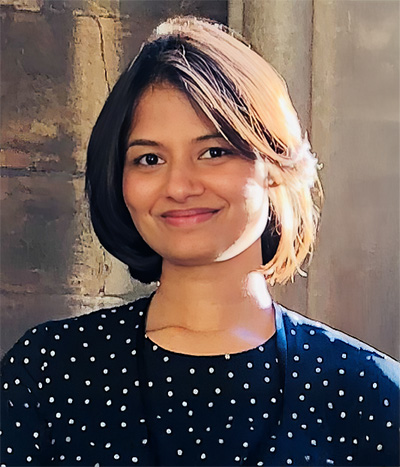
Neelima Jain (Speaker)
Energizing Viksit Bharat: India’s Technological Path to Economic Transformation Through Energy Independence
Abstract: India stands at a pivotal crossroads where emerging energy technologies will shape its economic transformation and global influence. This presentation examines how India can leverage technological innovations in its energy transition as a catalyst for achieving Viksit Bharat while balancing development imperatives with climate action. It analyzes the economic opportunities embedded in these technological shifts, revealing pathways that create substantial domestic dividends while positioning India for leadership in emerging global markets. The discussion identifies key emerging technologies that can unlock India’s comparative advantages in the clean energy economy, opening avenues for accelerated manufacturing and deployment. By embracing these technological frontiers, India can meet its growing energy demands, drive economic growth, and demonstrate a development pathway that resonates with emerging economies worldwide. The presentation offers insights into how India’s technological choices today are foundational to its emergence as a responsible economic superpower within the next decade.
Biography: Neelima Jain is Director of the States Initiative at UC Berkeley’s Indian Energy and Climate Center, where she leads state engagements and policy research on grid and industrial decarbonization. She also serves as an Adjunct fellow at the Center for Strategic and International Studies, strengthening U.S.-India energy policy relations. Previously, as CEO of EPAL (UK subsidiary of Energy Efficiency Service Ltd, Govt. of India), she led the company to become the fastest-growing Indian-owned company in the UK. She has also managed the landmark UJALA program across 60 million Indian households. With 19 years in sustainable energy, Neelima has advised the International Energy Agency and was recognized among the 100 most influential people in UK-India relations by India Inc.
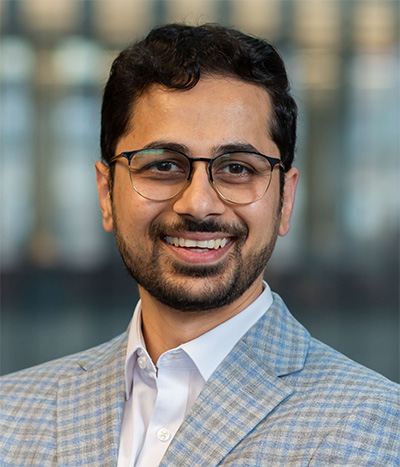
Shantanu Khanna (Speaker)
An Indian Enigma? Labour Market Impacts of the World’s Largest Livelihoods Program
Abstract: We examine the labor market impacts of the largest livelihoods programs in the world, India’s Deendayal Antyodaya Yojana-National Rural Livelihoods Mission (DAY-NRLM). A key aspect of this program is to mobilize rural women into self-help groups (SHGs). We combine administrative data on SHG membership across districts in India with survey micro-data on labour force and employment outcomes of rural women between 2011 and 2019. Using a generalized difference-in-differences approach, we find that SHG membership is positively associated with labour force participation and employment of rural women. We also find that SHG membership is associated with a shift towards self-employment and a crowd-out of casual work among the employed. Supplementary analysis based on primary survey data from Maharashtra allows us to examine the relationship between SHG membership and economic activity at the individual level. The results confirm a positive association between SHG membership and economic activity.
Biography: Dr. Shantanu Khanna is an Assistant Professor of Public Policy and Economics at Northeastern University. He is an Invited Researcher at J-PAL, a Research Affiliate at the Institute of Labor Economics (IZA), and a Research Fellow at the Global Labor Organization (GLO). He was awarded a Ph.D. in Economics from the University of California, Irvine. His primary fields of interest are Labor and Development economics. His research explores issues like inequality, hiring and wage discrimination, job creation, and the impacts of public policies on labor markets in developing and developed countries.
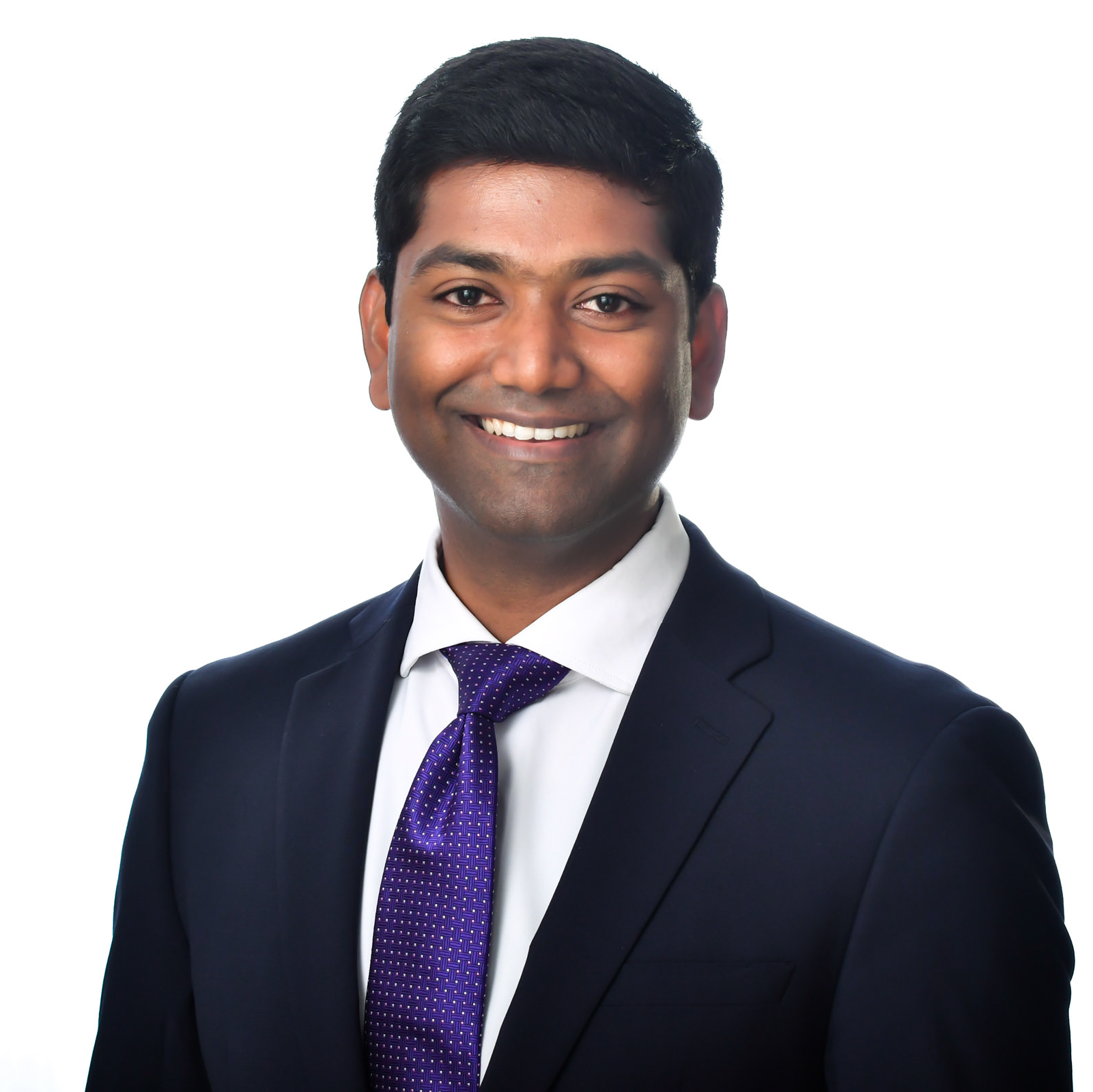
Buvaneshwaran Venugopal (Moderator)
Biography: Buvaneshwaran (Eshwar) Venugopal is an Assistant Professor of Finance in the College of Business at the University of Central Florida. He received his Ph.D. degree from the University of Houston. He obtained his Masters in Banking and Finance and Master of Applied Econometrics degrees from Monash University, and his undergraduate in Computer Engineering from the National Institute of Technology, Jaipur. He has been a member of the UCF faculty since May 2018.
International Relations Panel
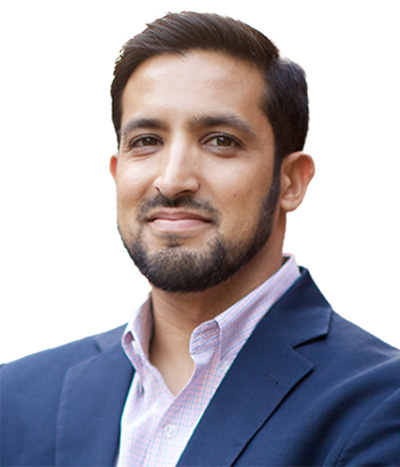
Sameer Lalwani (Speaker) (Zoom)
Could India Have Taiwan’s Back in a Crisis
Abstract: With the dramatic expansion of US-India defense and operational cooperation since 2020, a question arises in Washington as to what material contributions India could make to the US military’s “pacing challenge” –that is, the coalitional deterrence and defense of Taiwan? This paper assess that India has the potential to make significant military contributions to a coalition defense of Taiwan without leaving its backyard or projecting power east of the Malacca Strait. India’s military contributions to the defense of Taiwan could largely fall into three campaigns (none of which are mutually exclusive): 1) horizontal escalation on the continental border; 2) covering down in the Indian Ocean; and 3) enabling coalition force projection via logistics, overflight, and access. This paper details these three campaigns, the capabilities that underpin it, and the reasons why growing US-India defense relations and India’s growing stakes in cross-Strait stability unlock the possibility for major changes in Indian foreign and defense policy.
Biography: Dr. Sameer Lalwani is a senior expert on South Asia at the U.S. Institute of Peace and a non-resident senior fellow with the Center for Strategic and Budgetary Assessments. He has previously served as South Asia Program Director at the Stimson Center, an adjunct professor at George Washington University’s Elliott School of International Affairs, and a Stanton nuclear security postdoctoral fellow at the RAND Corporation. Dr. Lalwani’s research interests include nuclear deterrence, interstate rivalry, alliances, crisis behavior, counterinsurgency and Indo-Pacific security. He is a term member with the Council on Foreign Relations, and a contributing editor to War on the Rocks. He earned his doctorate in political science from the Massachusetts Institute of Technology and was an affiliate of the MIT Security Studies Program.

Zachary Constantino (Speaker)
Prospects for Accelerating Defense Cooperation with India
Abstract: Defense ties between the United States and India are now a cornerstone of the strategic partnership. Washington is New Delhi’s partner of choice regarding military exercises, acquisition of advanced technology, and deepening defense industrial integration. In addition, the U.S. and India are committed to renewing a ten-year framework for defense cooperation, providing opportunities to both strengthen India’s role as a net security provider in the Indian Ocean Region and complicate China’s calculus in Asia. At the same time, maximizing the benefits of India’s defense modernization drive necessitates structural reforms within New Delhi’s procurement bureaucracies and armed forces and shifts in spending priorities. India will almost certainly need to scale up research and innovation and enhance the private sector’s role. Deploying more cutting-edge platforms will probably drive demands for establishing a robust intelligence architecture to sustain operations at the strategic and operational levels, renewing attention on intelligence reform while spurring greater information-sharing with Indo-Pacific partners.
Biography: Zachary Constantino is a Practitioner Fellow at the University of British Columbia’s School of Public Policy and Global Affairs (SPPGA), where he lectures on Indo-Pacific security, the geopolitics of South Asia, and how to develop persuasive communication strategies. Before joining SPPGA, he served for twenty years in the United States Government, working at the intersection of international security, diplomacy, and intelligence. Zachary’s work in the Indo-Pacific region specifically focused on technology collaboration, defense modernization, and maritime security. He is also an adjunct lecturer at George Washington University, where he teaches courses on intelligence and national security. The views he expresses are his own.
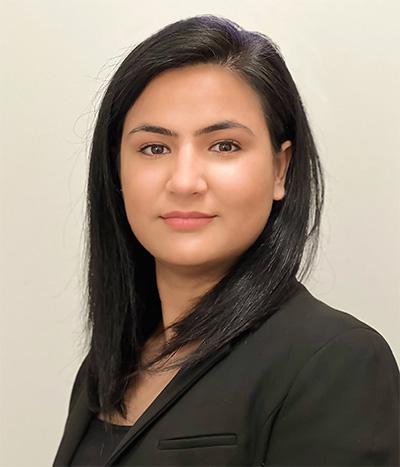
Aditi Malhotra (Speaker)
India’s Role Evolution in a Changing World Order: Opportunities and Challenges
Abstract: In the past two decades, the global order established after the Second World War has been undergoing substantial changes, with recent developments pointing to a clearer and more tangible shift towards a more multipolar world. Once shaped predominantly by the United States, the world order is now being increasingly influenced by changing dynamics, especially with the second Trump administration. Within this context, India plays a pivotal role, perceiving the ongoing transition as both an opportunity and a challenge. The opportunity lies in carving out a more prominent space for itself within the international community, while the challenge arises from an inward-focused, transactional U.S. approach, which provides greater room for China’s growing dominance. India’s evolving self-perception as a key pole in the multipolar world, particularly as a prominent actor in Indo-Pacific region is crucial to this transition. The paper will explore India’s evolving security role evolution over the past three decades, examining both internal and external factors influencing this shift, along with the challenges it faces globally and domestically. The interplay of opportunity and challenge is analyzed using the role conception framework, grounded in the constructivist school of thought in International Relations.
Biography: Dr. Aditi Malhotra is a Fellow at the Canadian Global Affairs Institute and the Centre for International and Defence Policy (CIDP). She is the author of two books: Understanding Security Role Evolution of US, China and India: Setting the Stage (Routledge, 2022) and India in the Indo-Pacific (Barbara Budrich, 2022). Dr. Malhotra previously served as Editor-in-Chief of the Canadian Army Journal (CAJ) and was the co-editor of the Journal for Intelligence, Propaganda and Security Studies (Graz, Austria). She has held visiting fellowships at the Henry L. Stimson Center (Washington, D.C.) and the Norwegian Institute for Defence Studies (Oslo). Additionally, Dr. Malhotra has served as a Senior Research Fellow at the National Institute of Advanced Studies and as an Associate Fellow at the Centre for Land Warfare Studies (CLAWS) in India, where she also served as the deputy editor of Scholar Warrior, a biannual journal. Malhotra holds a Ph.D. in Political Science from the University of Muenster, Germany, and a master’s in International Studies from the University of Sheffield, United Kingdom. Her research focuses on security issues in the Indo-Pacific region and nuclear deterrence, and she regularly participates in Track II dialogues on nuclear deterrence and escalation dynamics.

Thomas Dolan (Moderator)
Biography: Associate Professor & ICCAE Director, Research Areas: International Relations, Security Studies, Political Psychology, Insurgency, Terrorism, Intelligence. My main research interests are focused on decision-making about war and conflict, intelligence, and insurgency. My work on decision-making has focused on the role of emotion in leaders’ wartime decisions about strategy, the use of WMDs, and war termination. My work on insurgency and intelligence is currently informed, to a large degree, by archival materials related to participants in the World War II-era French resistance. I also have interests in public opinion research and just war theory. I have published articles in International Organization, Political Psychology, International Studies Quarterly, Security Studies, the Journal of Conflict Resolution, Foreign Policy Analysis, and other journals.
